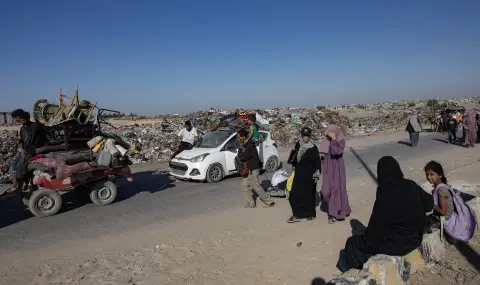Following the terrorist attacks by Hamas against Israel on October 7, 2023, the hope of many Palestinian refugees to return to their old homes is receding. There are many more Palestinian refugees today than in 1948.
How many are Palestinian refugees?
The Palestinian population in the Middle East is estimated at seven million people, but they have a different legal status. The United Nations Relief and Works Agency for Palestine Refugees in the Near East (UNRWA) says it is currently supporting 5.9 million people in the region. They live in 58 refugee camps in Jordan, Syria, Gaza, the West Bank, including East Jerusalem, and Lebanon.
Palestinian refugees also live in Egypt. About 100,000 people have fled there since the start of the war between Israel and Hamas. And 1.5 million Palestinian Israelis live in Israel.
Who is eligible to register as a refugee?
According to UNRWA, refugees can be considered "all persons whose residence was in Palestine between 1 June 1946 and 15 May 1948 and who have lost both their homes and means of livelihood as a result of the 1948 conflict".
This also applies to "male descendants of Palestinian refugees, including adopted children". As a result, the number of registered individuals has increased from 750,000 in 1950 to almost six million today.
What conditions do Palestinian refugees live in?
The daily lives of many Palestinian refugees and their families are marked by poverty and discrimination. In many Arab host countries, Palestinians cannot obtain citizenship.
According to UNRWA, about 80% of Palestinian refugees in Lebanon live below the poverty line there. They cannot own property, are not allowed to work in any profession, and do not have access to the state education and health system.
About 2.3 million Palestinians are registered as refugees in Jordan. It is the only Arab country that has granted citizenship to this group of people. More than half of the Jordanian population is now of Palestinian origin.
The situation in Syria is steadily deteriorating due to the ongoing civil war there. In 2021, a UNRWA study revealed that 82% of registered Palestinian refugees live in absolute poverty. Many of them are now returning to Syria because of the conflict between Israel and the Lebanese militia Hezbollah.
Why is there an organization specifically for Palestinian refugees?
The United Nations Relief and Works Agency for Palestine Refugees in the Near East was established by UN Resolution 302 (IV) of 8 December 1949 and began its work on 1 May 1950. In December 2022, the UN General Assembly extended UNRWA's mandate until 30 June 2026. Its task is to care for Palestinians who were displaced or forced to leave their homes as a result of the Israeli-Arab War and the establishment of the State of Israel on May 14, 1948, as well as their descendants. Palestinians call this historical period "Nakba" or "disaster".
Another UN body - the High Commissioner for Refugees - is responsible for all other refugees and stateless persons around the world. It was also founded in 1950.
The separation of responsibilities means that in countries like Egypt, where there are Palestinian refugees but UNRWA is not represented, those affected live in a legal vacuum because the High Commissioner has no authority to care for them.
Why does Israel want UNRWA disbanded?
The Israeli government accuses UNRWA of involvement in the October 7 massacre and claims the organization was infiltrated by Hamas. As a result of the allegations, several donor countries, including the US, the European Commission and Germany, suspended their payments to UNRWA.
The UN has launched an internal investigation into the allegations. A statement issued on 5 August 2024 stated that nine UNRWA staff had been dismissed for their possible involvement in the Hamas-led attacks on Israel on 7 October 2023. Charges against ten other staff could not to be confirmed.
Do they have the right to return?
According to Article 11 of UN Resolution 194, all refugees have the right to return to their homes if they are willing to live in peace with their neighbors. In the eyes of the governments of many Arab countries, this also applies to the descendants of those displaced in 1948.
"The Nakba disaster is a serious source of identity for the Palestinians and demonstrates injustice," explains Peter Lintel from the German Foundation "Science and Politics". According to the expert, the right of return "can only be resolved within the framework of peace negotiations and in the context of a Palestinian state".
Authors: Astrid Prange, Jennifer Hollis
